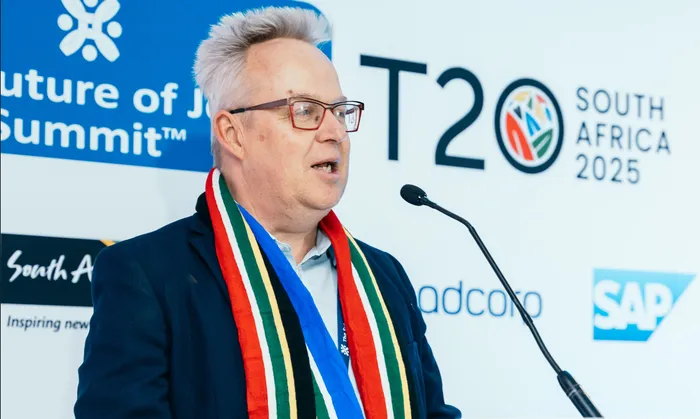What Bafana’s resilience teaches business about championship mindset

Dr Nik Eberl is the Founder & Executive Chair: The Future of Jobs Summit™ (Official T20 Side Event) .He will be writing a regular column in Business Report.
Image: Supplied
“The button has been turned.” Those five words from Bafana Bafana coach Hugo Broos, following the team’s draw against Zimbabwe, reveal more about championship mindset than most business books ever could.
On Friday night at Moses Mabhida Stadium, the players walked off the pitch devastated. A goalless draw when victory was within reach. The kind of setback that breaks spirits, erodes belief, and, for many teams, marks the end of a dream.
But here’s the difference between ordinary teams and extraordinary ones: champions know how to turn pain into power. And in that moment, Broos proved that leadership is not about avoiding disappointment — it’s about managing recovery.
Having spent two decades interviewing leaders across five continents, I’ve seen this pattern time and again. Championship teams and world-class organisations share one defining ability — the art of the reset.
The 24-Hour Rule
Broos gave his players exactly 24 hours to feel the pain. Not a minute more. By Sunday’s training session, team captain Ronwen Williams noticed something extraordinary. “If you could have seen our training yesterday,” he said, “you would have seen that the boys mean business.”
That quick turnaround — from frustration to focus — is the secret ingredient behind sustainable success. Broos’ approach mirrors what elite performers across industries understand: emotion has a shelf life. You acknowledge disappointment, but you don’t let it linger.
In the world of business, we face our own Moses Mabhida moments every week.
- The deal that slips through our fingers.
- The product that underperforms expectations.
- The campaign that doesn’t land the way we hoped.
The question isn’t whether setbacks will happen. The real question is how quickly you can turn that button.
Belief Is the Real Game-Changer
After that draw, Broos reminded his squad, “The qualities didn’t disappear with the draw.” It wasn’t their talent that faltered — it was their mentality that needed recalibration.
The same applies in business. Your team’s capabilities don’t vanish after a missed quarter. Your market position doesn’t evaporate after one bad press cycle. What changes is belief — and belief, unlike strategy, can be restored in an instant.
This is what I call the championship mindset: the discipline to believe in your process even when the scoreboard doesn’t reflect your effort. As Williams put it, “Why do we need to start doubting ourselves now? We’ve come in leaps and bounds… we don’t have to change much.”
That’s wisdom most boardrooms would do well to adopt. Too often, one setback leads executives to abandon everything that once worked — their brand identity, their strategy, their culture. They confuse temporary outcomes with permanent failure. Champions, by contrast, know that resilience isn’t built by avoiding failure, but by failing forward faster than the competition.
From Bafana to Business: The Resilience Revolution
Bafana Bafana’s evolution from also-rans to contenders wasn’t an overnight miracle. It was the result of a culture shift — from playing not to lose, to playing to believe.
We are witnessing a transformation that mirrors the journey of high-performing South African organisations. Those that thrive today — despite economic headwinds, market uncertainty, and social complexity — are those that master the rhythm of resilience. They have institutionalised what I call The 24-Hour Rule of Leadership:
- Feel it fully.
- Learn from it quickly.
- Let it go completely.
It’s a model that keeps emotional energy flowing forward instead of sideways. Because progress depends not on perfection, but on momentum.
The Rwanda Moment — and Beyond
As Bafana prepared for their next clash in Mbombela against Rwanda, the equation was simple: win and hope. But the deeper lesson was far more profound — teams that can reset fastest are the ones that win most consistently.
This same principle defines South Africa’s greatest comeback stories, in both sport and business. Think of how our rugby team rebuilt itself into a dynasty of belief. Think of how our entrepreneurs continuously innovate in the face of constraint. Think of how our communities rally around purpose in moments of national adversity.
There’s something uniquely South African about that ability to turn adversity into advantage. It’s the DNA of resilience — the conviction that no challenge is too great, and no failure final. And that is exactly what we are seeing in this new generation of Bafana Bafana players. The button has been turned. The belief is back. The team spirit burns bright once more.
Turning Your Button
Every organisation, at some point, faces its own version of Friday night’s draw — that moment of collective disappointment when the plan didn’t land and morale dips. But leadership, as Broos reminded us, isn’t about shielding your people from those moments. It’s about giving them the confidence to reset and rise stronger.
So, what button does your organization need to turn today? Because in the end, championships aren’t won by teams that never fail. They’re won by teams that fail, reset, and rise — all before their competition finishes feeling sorry for themselves.
Dr Nik Eberl is the Founder & Executive Chair: The Future of Jobs Summit™ (Official T20 Side Event). He is Author: Nation of Champions: How South Africa won the World Cup of Destination Branding
*** The views expressed here do not necessarily represent those of Independent Media or IOL.
BUSINESS REPORT